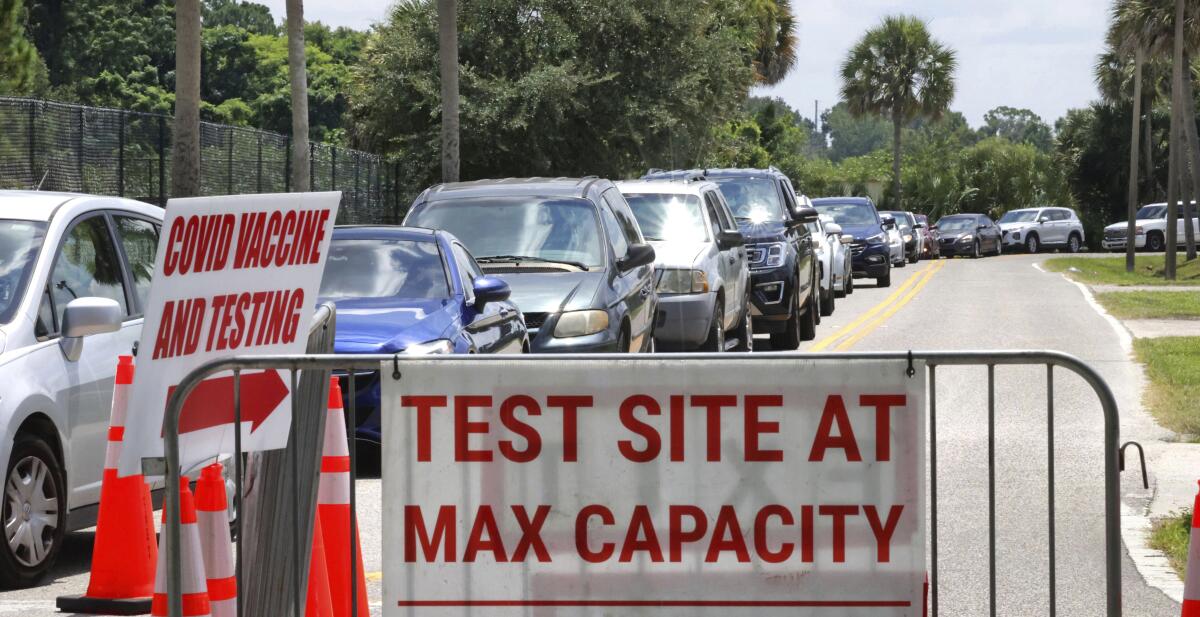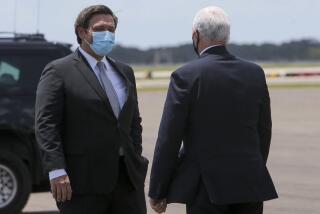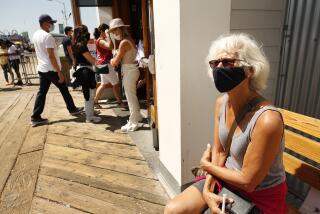Florida coronavirus cases jump 50% as surge continues

- Share via
FORT LAUDERDALE, Fla. — Florida’s coronavirus cases jumped 50% this week, the state Health Department reported Friday, continuing a six-week surge that has seen it responsible for 1 in 5 new infections nationally, becoming the outbreak’s epicenter.
The release came shortly after Gov. Ron DeSantis barred school districts from requiring students to wear masks when classes resume next month. It also comes as theme park resorts in Florida again started asking visitors to wear masks indoors.
More than 110,000 new coronavirus cases were reported statewide over the last week, up from 73,000 last week and 11 times the 10,000 reported the week of June 11, six weeks ago. Case numbers are now back to where they were in January, just before vaccinations became widely available.
On Saturday, Florida reported 21,683 new cases, the state’s highest one-day total since the start of the pandemic, according to federal health data.
The Florida Hospital Assn. said Friday that statewide COVID-19 hospitalizations are nearing last year’s peak. More than 9,300 patients are hospitalized, up from 1,845 a month ago and nearing the record 10,179 set on July 23, 2020. On a per capita basis, Florida now has more people hospitalized than any other state.
The state reported 409 deaths this week, bringing the total to more than 39,000 since its first in March 2020. The state’s peak happened in mid-August 2020, when 1,266 people died over a seven-day period. Deaths usually follow increases in hospitalizations by a few weeks.
Bad federal policy combined with an altered climate is wiping out California’s chinook salmon, plus more from the week in Opinion.
DeSantis has blamed the surge on a seasonal increase — more Floridians are indoors because of the hot weather with air conditioning circulating the virus. About 60% of Floridians 12 and older are vaccinated, ranking it about midway among the states.
DeSantis said his executive order barring mask mandates at schools will improve students’ experience and make it easier for them to focus on learning.
“I have [three] young kids. My wife and I are not going to do the mask with the kids. We never have; we won’t. I want to see my kids smiling. I want them having fun,” DeSantis said at a news conference in southwest Florida a few hours before he signed the executive order. DeSantis is seeking reelection next year and has been positioning himself nationally for a possible 2024 presidential bid.
DeSantis also contended there is no evidence masks prevent outbreaks at schools, which is at odds with the Centers for Disease Control and Prevention’s guidelines recommending “universal indoor masking for all teachers, staff, students, and visitors to K-12 schools, regardless of vaccination status.”
Universal Orlando Resort and SeaWorld on Saturday became the latest theme park resorts in Florida to again ask visitors to wear masks indoors, with Universal also ordering its employees to wear face coverings to protect against COVID-19, which has been surging across the state.
All workers at Universal’s Florida park Saturday started being required to wear masks while indoors as the employees returned to practicing social distancing. The home to Harry Potter and Despicable Me rides also asked visitors to follow federal and local health guidelines by voluntarily wearing face coverings indoors.
“The health and safety of our guests and team members is always our top priority,” Universal said in a statement.
DeSantis’ critics say his unwillingness to mandate mask wearing in schools endangers the health of students and staff.
“We know that masks are a simple and effective way to help prevent virus spread, and from a medical perspective it makes absolutely zero sense to discourage their use,” said Dr. Bernard Ashby, head of Florida’s progressive Committee to Protect Health Care. “DeSantis’ power grab will put the health of kids and teachers alike at risk.”
DeSantis’ decision came after the Broward County school board voted to require masks and other districts and colleges across the state were considering it.
“We will have to change our policy,” Broward board member Debbi Hixon told the South Florida SunSentinel. “I am not looking to defy the governor. I believe it is an irresponsible decision but if it is the law, I will agree to follow it.”
The Florida Education Assn., the state’s teachers union, said DeSantis should leave the decision to local officials rather than impose a statewide edict — a position he once held. When the pandemic began in March 2020, DeSantis said local officials should control the response, that the business closures and mask mandates imposed in Miami, Tampa and other big cities wouldn’t work in small, rural counties.
“Gov. DeSantis continues to think that Tallahassee knows best what all Floridians need,” union President Andrew Spar said in a statement. “We reject that kind of thinking. Instead, we ask Gov. DeSantis to allow all Florida’s citizens to have a voice by empowering the elected leaders of cities, counties and school districts to make health and safety decisions locally.”
Meanwhile, Publix, the state’s largest supermarket chain, announced Friday that employees will again be required to wear masks and several hospitals said they are postponing elective surgeries and limiting visitors.
At Tampa General Hospital, the 90-plus patients hospitalized with COVID-19 already exceeds the previous high of 86, said Dr. Seetha Lakshmi, medical director of its Global Emerging Diseases Institute. She said the hospital, like many, can’t hire enough staff and it is leaving those working exhausted.
“It feels like we are getting hit by a train, the pace is so fast and uncontrolled,” Lakshmi said. “I just don’t have any words anymore. This is awful, just awful and it is going to be awful.”
She said last year, her patients’ median age was in the 70s. Now, it is just over 50, with the younger patients getting sicker than in the past.
She pointed to a patient in his early 30s whose lungs “sound like Velcro” being pulled apart. A father of young children, he will likely have permanent damage and might need a transplant eventually, she said.
She said 83% of Tampa General’s COVID-19 patients are unvaccinated while the others have immune-deficiency issues that prevented the vaccine from working.
The change in policy at theme parks came after the U.S. Centers for Disease Control and Prevention recommended that everyone wear masks indoors, regardless of vaccination status.
SeaWorld on Saturday posted on its website that it was recommending that visitors follow the updated federal recommendations and wear face coverings while indoors.
Crosstown rival Walt Disney World started requiring employees and guests older than 2 to wear masks Friday, but it also went a step further. The Walt Disney Co. said in a statement that it will be requiring all salaried and non-union hourly employees in the U.S. who work on site to be fully vaccinated.
Disney employees who aren’t already vaccinated will have 60 days to do so and those still working from home will need to show proof of vaccination before returning. Disney said it was discussing the vaccine requirements with the union, and added that all new hires will be required to be fully vaccinated before starting work at the company.
More to Read
Sign up for Essential California
The most important California stories and recommendations in your inbox every morning.
You may occasionally receive promotional content from the Los Angeles Times.











